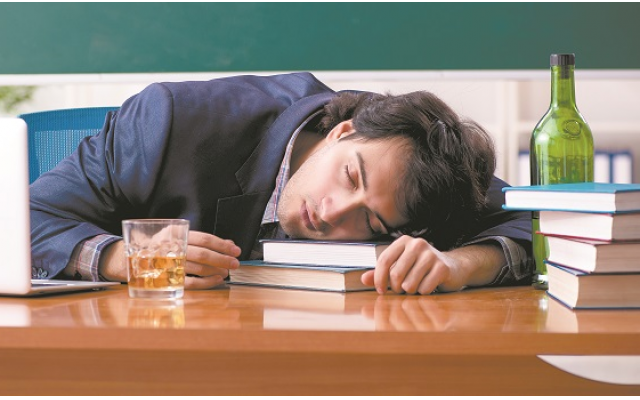Struggling With Drug or Alcohol Abuse
10 Signs to Look for in Your College Student
Justin Milrad is the CEO of The Berman Center.
Drug and alcohol abuse on college campuses continues to be a problem after many decades. As a member of several different student groups, I have many memories that I’m not super proud of. The college years are meant to enhance a person’s life skills so they can move toward fulfilling their career and life goals. For many, it’s the first time in their life that they have complete control over their time and schedule. This is the time that life skills become extremely valuable. With the combination of academics, social and life pressures, and the overall stress of being in college, some students turn to alcohol and drugs not just for partying, but for coping. If things spiral out of control, students may lose sight of their hopes and dreams.
College is a time where many individuals start developing issues that could lead to long-term problems. As parents, family and friends, we must understand and pay attention to the patterns and behaviors of students.
So how can you tell if a student is abusing drugs or alcohol? If you’re paying attention, many of the signs are easy to detect. Below is a list of 10 items to keep an eye out for. And note: just because someone might exhibit some of these signs, it doesn’t necessarily mean they are abusing drugs or alcohol. However, these signs can help you identify if an issue might exist.
- Binge Drinking – Students who drink regularly to blackout drunk. This is a visible sign of alcohol abuse. According to the Centers for Disease Control and Prevention, for men, binge drinking is characterized by having five or more drinks in two hours, and for women, it’s four.
- Declining Grades – The National Institute on Alcohol Abuse and Alcoholism’s research demonstrates a pattern that students who binge drink regularly perform poorly in their studies. Instead of studying, students are drinking. This often leads to hangovers, oversleeping, skipping classes, and just not getting their work done. A harmful side effect is that some students counter the alcoholism with stimulants or what they call “study pills.”
- Change in Appearance – Typically, a student who drinks excessively, does drugs, take pills, or has an eating disorder will impact how they look physically. These visible physical indicators include weight loss or gain, changes in their face or hair, dark circles around their eyes, lack of color in their cheeks, or sallow skin. Additionally, basic hygiene neglect, such as taking showers, brushing teeth, and unkempt appearances, are also warning signs. Alcohol and drugs weaken the whole body, including the liver, heart, immune system and nervous system.
- Unexplained Financial Difficulties – If your child is constantly asking for money, make sure you know where it’s going and try to identify any suspicious patterns. The budget for a student attending college is pretty predictable. If you see patterns that don’t appear to make sense, it’s possible that money is being spent on drugs or alcohol.
- Sleeping Patterns – Drugs and alcohol affect sleeping patterns. Keep an eye out for staying up all night and sleeping all day. If you find your college student asleep at 3 p.m. on a weekday, that could be a sign that something is up.
- Withdrawal from Healthy Friends – If your child is acting secretive with close friends and hanging out with others, there is a chance something is going on. Often, they are ashamed to let their friends see them in this light. As well, they are protecting their right to continue abusing substances and don’t want to be nagged by those who care about them.
- Uncharacteristic Mood Swings – Some students who are abusing drugs and alcohol no longer seem like themselves. Their mood swings appear to be a complete change in character. A happy person with a positive attitude and energy may turn into a lifeless, negative, and sour person whose mood fluctuates and turns on a dime. Withdrawal symptoms can cause agitation and even anger.
- Reckless Behavior – As a student continues to use drugs and alcohol, their behaviors may become erratic and sometimes even abusive. Drunk driving, unsafe sex, mixing pills and alcohol, violence, and vandalism are just a few examples of reckless and risky behavior.
- Lack of motivation – Has your college student gone from joining every club and sports team to sitting on the couch playing video games all day? Continuous use of drugs or alcohol will lead to lethargy and a lack of motivation to do much of anything.
- Inability to make contact – Have you tried over and over again to get in touch with your child? Sometimes it’s tough to reach your child, they rush you off the phone, or always appear busy and agitated. This could be a sign that something bigger is going on. After all, who doesn’t have time for mom and dad?
As parents and friends, we must keep an eye out for our loved ones. College is a time to grow and develop for the next chapters in our lives. While we want our kids to grow, become independent, and find their own pathways, there is no harm keeping an eye on them and helping them be the best version of themselves.
Justin Milrad is the CEO of The Berman Center as well as the co-founder of The Blue Dove Foundation and can be reached at justin@bermancenteratl.com.
The Berman Center offers a customized, multidisciplinary treatment plan for those dealing with addiction and/or mental health issues. The Blue Dove Foundation provides tools to understand, support and overcome the challenges of mental illness and substance abuse.
For more information, call The Berman Center at 770-336-7444, or send questions to questions@bermancenteratl.com or call the Blue Dove Foundation, 404-490-2391 or questions to info@thebluedovefoundation.org.




comments